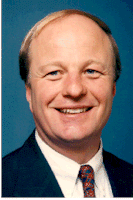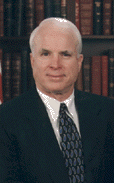
Rep. Franks
House Adopts Franks' Internet Filtering Bill
(June 18, 1999) The House adopted the Franks amendment to the juvenile crime bill, which requires schools and libraries receiving e-rate subsidies to install filtering or blocking technology for computers with Internet access.
Related Pages |
| Summary of Filtering Bills. |
| HR 896, Children's Internet Protection Act. |
| Note: the House also adopted an amendment that provides that the filter is for Internet access during use by minors. |
The amendment adopted by the House on Thursday evening, June 17, contains the language of Rep. Bob Franks' (R-NJ) Children's Internet Protection Act. It provides that schools and libraries which receive universal service funding for computer networking, Internet access, and telecommunication services must use software on its computers that filters out access to material that is harmful to children. The amendment was adopted by an unrecorded voice vote after a brief debate.
On June 15 the House Rules Committee adopted a rule that permitted the Franks bill to be offered on the House floor as an amendment to the House version of the juvenile crime bill. Technically, the House is currently debating and amending both HR 1501, the Consequences for Juvenile Offenders Act of 1999, and HR 2122, the Mandatory Gun Show Background Check Act.
The House passed its final bill late Thursday night on a roll call vote of 287 to 139. The Senate passed its version of the bill on May 20.
The House agreed to the Franks Amendment (Amend. No. 41) by a voice vote. However, the House first adopted by voice vote an amendment to his amendment that provides that the filter or block is for Internet access during use by minors.
The Franks bill is opposed by liberal civil liberties groups, such as People for the American Way and the ACLU, and the American Library Association. The Franks bill is supported by other groups, including Gary Bauer's Family Research Council, Enough is Enough, National Coalition for Protection of Families and Children, and Filtering Facts.
 |
|
Rep. Franks |
"This amendment will ensure that our children can take advantage of this revolutionary learning tool without being assaulted by material that is not only inappropriate, but could be dangerous," Rep. Franks stated during the floor debate.
"Filtering technology, which many parents already have installed on their home computers, would keep materials designed for adults out of the reach of our children. For generations, schools and libraries have routinely decided what books are appropriate for children to read. My amendment would require these institutions to exercise the same standard of care when it comes to the Internet."
Franks has been a leader in the House for several years on Internet filtering. He is also a co-chairman of the Congressional Missing and Exploited Children's Caucus.
The leader in the Senate on this issue is Sen. John McCain (R-AZ). He is sponsoring, along with Sen. Ernest Hollings (D-SC), S 97, an almost identical bill.
 |
|
| Sen. McCain |
"I am extremely pleased that the House has included this language in the youth violence bill that would protect children on the Internet," said Sen. McCain in a press release. "Senseless and violent tragedies involving school children have reminded us that problems of modern life don't stop at the schoolhouse door. Parents have an obligation to protect their children from exposure to harmful material at home, but have no ability to do the same in schools and libraries. This legislation allows local communities to decide what to filter out, and how to protect the minds of our children from being polluted by obscene and violent material."
These bills, HR 896 and S 97, affect all elementary schools, secondary schools, and libraries that receive federal funds under the universal service provisions of Section 254 of the Telecom Act of 1996. This program, which is more commonly known as the "e-rate," subsidizes computer networking, Internet access, and telephone service for schools and libraries. The e-rate program is run by the Federal Communications Commission, and the Schools and Libraries Division of the Universal Service Administration Corporation (USAC), which the FCC controls.
The bill would require that schools and libraries receiving "e-rate" subsidies to use filtering software on computers to block access to material that is "harmful to minors."
To receive "e-rate" funds, a school or library would have to certify to the FCC that it has "(A) selected a technology for computers with Internet access to filter or block material deemed to be harmful to minors; and (B) installed, or will install, and uses or will use, as soon as it obtains computers with Internet access, a technology to filter or block such material."
The administration's point man on this issue, Larry Irving, opposes mandatory filtering for e-rate recipients. He wrote in a letter to the FCC on April 7, 1999 that "the Federal Government should not mandate a particular type of technology, such as filtering or blocking software. Rather, we should encourage "acceptable use" policies by all public institutions that offer access to online resources, including the Internet."
However, in the past, President Clinton has not vetoed any similar bill. He signed
legislation containing the Communications Decency Act and the Children's Online Protection
Act.
Related Stories Hearing on Internet Indecency, 2/10/98. |